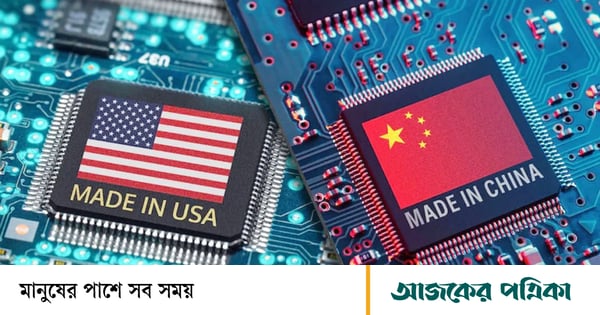The US government started the third round of operations against China's semiconductor or chip industry last Monday. The country imposed export bans on 140 Chinese companies. These include chip equipment maker Nowra Technology Group. This information is known in the report of news agency Reuters.
The US wants to limit China's chip manufacturing capacity through this move. In addition to this, new restrictions have also been imposed on Chinese chip equipment manufacturers Piotech, ACM Research and C Carrier Technology. Exports of advanced memory chips and other chip-making equipment to China have also been clamped.
The move is seen as the Biden administration's last attempt at censorship on China. The move is aimed at limiting China's entry into the chip market and production. It may aid military applications of artificial intelligence (AI) or otherwise pose a threat to US national security. This comes just weeks after President-elect Donald Trump's inauguration. Many of Biden's anti-China stances are expected to remain in place in the Trump administration.
The sanctions package includes—an export ban on high-bandwidth memory chips sent to China, which are essential for high-end applications like artificial intelligence, a ban on 24 new chip-making equipment and three software tools, and new export bans on chip-making equipment made in countries like Singapore and Malaysia.
Restrictions on these tools would also likely hurt US companies including Lam Research, KLA and Applied Materials. It will also affect companies outside the US, such as Dutch machinery manufacturer ASM International.
The new sanctions cover nearly two dozen Chinese semiconductor companies, two investment firms and more than 100 chipmakers. These companies include Soussure Technology Co., C'N Qingdao, and Shenzhen Pensun Technology Co., which work with China's Huawei Technologies Co. The telecom tool maker has been hit by US sanctions. But now it produces advanced chips itself.
These companies will be added to the 'entity list' or 'trade embargo list', barring any exports unless US suppliers obtain a special license to ship goods to them.
Asked about the US sanctions, Chinese Foreign Ministry spokesman Lin Jian said such behavior harms the international economic trade system and disrupts the global supply chain. China will take steps to protect the rights and interests of its companies, he said at a regular press conference on Monday.
China has stepped up its efforts to become self-sufficient in the semiconductor sector in recent years. That's because the US and other countries have restricted exports of advanced chips and the equipment to make them. But it still lags behind companies like Nvidia and chip equipment maker SML when it comes to AI chips.
In addition, the United States is ready to impose additional sanctions on Semiconductor Manufacturing International Corporation, China's largest chip contract manufacturer. The company was blacklisted in 2020. But at that time there was a policy in the United States that allowed billions of dollars worth of licenses to ship products to this company.
The entity list will include three US companies investing in the chip sector for the first time. Chinese private equity firm Wise Road Capital, technology firm Wingtech Technology Co and JC Capital have been added to the list.
Other companies generally do not receive licenses to ship products to entities on the entity list.
The new package could hurt some US allies. This is because it will restrict their companies from shipping their products to China. The new rule would increase the U.S.'s ability to control exports of chip-making equipment made by U.S., Japanese, and Dutch manufacturers. These will be manufactured in other parts of the world and shipped to specific chip plants in China.
Equipment manufactured in Israel, Malaysia, Singapore, South Korea and Taiwan will come under the new rules. However, Japan and the Netherlands are exempt from this rule.
The US rules on foreign companies will apply to 16 companies that play a key role in making China's most advanced chips.
There will be one more change in this rule. According to this change, even if a product contains part of US technology or chip, it will fall under the control of the US and the license permission from the US will be required to export the product to China. Even if only part of that product is US technology, it will still be subject to US control.
The new rules have been published after lengthy negotiations, particularly with Japan and the Netherlands.
But the US plans to grant exemptions to countries that adopt similar controls.
Another rule of the package is that memories used in AI chips associated with 'HBM2' or later will be subject to this ban. They are manufactured by South Korea's Samsung, SK Hynix and the US company Micron. However, only Samsung Electronics is expected to be affected more. Samsung sells about 20 percent of its HBM chips in China.
The new rules are the third package of sanctions imposed on China under the Biden administration. In October 2022, the United States released a comprehensive regulatory framework. The measure limited the sale and production of certain high-end chips. It was considered the biggest shift in US technology policy towards China since the 1990s.

